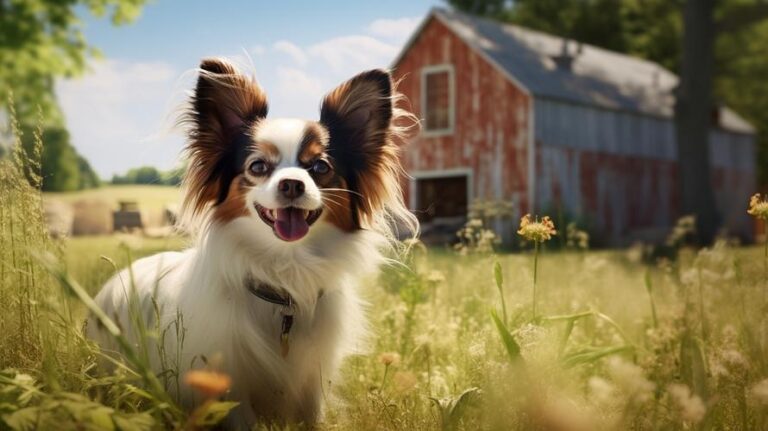For the uninitiated, the Papillon dog breed is a small yet robust, friendly, and intelligent breed. Exceptionally energetic for their tiny size, these unique fur-babies flaunt an unmistakeable butterfly-like ear fringing, thus their name ‘Papillon,’ which is French for ‘butterfly.’ Fun fact hover, for those who didn’t know: some of these dogs have droopy ears and are referred to as ‘Phalenes,’ which stands for ‘moth’ in French.
Papillons, as animated and spirited as they are, thrive on a well-balanced, nutritious diet. The optimal nourishment for your Papillon will vary by age, size, health, metabolism, and activity level, but there are specific food guidelines and choices that can contribute to their overall wellness and longevity.
Before hopping into the best food choices for your Papillon, let’s crack an interesting myth you’ve probably heard: “All small breed dogs are picky eaters.” Despite their petite nature, most Papillons are far from being finicky. On the contrary, they often display a robust and hearty appetite for their size!
Now that we’ve busted that myth lets move onto the scrumptious bits—figuring out the best feeding approach for your Papillon.
1. Considering Your Dog’s Age:
Just like people, dogs have different nutritional needs at various life stages. Puppies generally need more protein to support their rapidly growing bodies, while older dogs may need fewer calories to maintain a healthy weight.
When it comes to Papillon puppies, it’s crucial to ensure they receive an energy-dense diet to fuel their rapid growth. High-quality puppy formulas enriched with protein, essential fatty acids, and the right amount of carbohydrates are often best. Feeding them three to four times daily can help sustain their energy levels.
Middle-aged Papillons, typically slower and less energetic than juveniles, need balanced adult dog food. They may only require feeding once or twice a day, and their diet might need adjustment if they are overweight or have any chronic illnesses.
Senior Papillons also have unique dietary requirements. If your fur friend is in its twilights years (usually above nine), you might consider transitioning them to a senior-specific diet. These foods often contain less fat, fewer calories, and more fiber to help with digestion and weight management.
2. Dry Food vs. Wet Food:
A dilemma numerous dog owners wrestle with is whether to feed their pet dry or wet food. The choice isn’t as straightforward for a Papillon, a breed predisposed to notorious dental issues.
Dry food can help scrape off the plaque, reducing the risk of dental diseases. Kibble also tends to be less expensive and easier to store than wet food. However, if your Papillon is a senior or has dental problems, softer, moisture-rich wet food can be more appealing and easier to eat.
3. Real Meat vs. Meal:
When evaluating dog food, terms like ‘chicken meal’ and ‘real chicken’ can cause confusion. In essence, ‘real’ describes whole, unprocessed meat, while ‘meal’ refers to the meat byproduct after water and fat are removed.
Both have their advantages. While ‘real’ offers high water content and is closer to what dogs would eat naturally, ‘meal’ provides concentrated, high-protein dry kibble. Still, remember that named meats or meals (like chicken meal or beef meal) are superior to generic (meat meal) or unnamed (poultry meal) sources.
4. Probiotics and Fiber:
A healthy gut can help ward off myriad health issues and diseases. Premium dog foods often contain active probiotics and fiber for digestive health. With Papillons being predisposed to pancreatitis and obesity, foods high in fiber that support healthy digestion are ideal.
Now let’s talk about actual food recommendations. Due to the variance in individual needs, preferences, budget, and dog’s condition, it’s impossible to crown one product as the best. However, these three stand out as premium choices:
- ‘Blue Buffalo Life Protection Formula Small Breed’: This dry kibble contains real chicken and brown rice, delivering reliable protein and carbohydrate sources. It also includes ‘LifeSource Bits,’ a mix of antioxidants, vitamins, and minerals endorsed by veterinarians. Plus, no artificial preservatives, colors, or flavors!
- ‘Royal Canin Papillon Breed Health Nutrition’: Tailor-made for Papillons, it features a patented kibble design encouraging chewing and supporting oral health. It boasts a balanced formula, ensuring your Papillon gets a well-rounded meal.
- ‘Wellness CORE Grain-Free Small Breed Dog Food’: If your pup has a sensitive stomach or grain intolerance, this grain-free formula can be a life-saver. Packed with proteins like deboned turkey, turkey meal, and chicken meal, it delivers essential nutrients for your Papillon without causing digestive issues.
Regardless of what food you settle for, remember the golden rule—everything in moderation! Overfeeding, even with best-quality food, can lead to obesity and other health problems. Monitor your Papillon’s weight and adjust the portions accordingly.
Lastly, a friendly reminder: Always consult with your vet before making significant changes to your dog’s diet. They can offer personalized advice based on your pup’s specific needs and history.
Your Papillon’s food is more than just sustenance—it’s a key element that impacts their health, longevity, and happiness. Here’s to happy, healthy, and well-nourished Papillons, lovingly fluttering around our lives!



